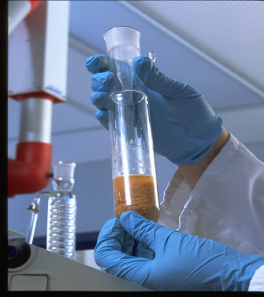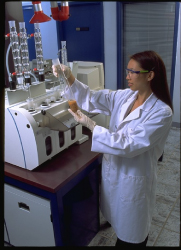 The Food Science program has been designed to combine the basic sciences, particularly chemistry, with specialty courses which are directly related to the discipline. Whether you are in Food Chemistry or Food Science option, much of the first year is spent in continued grounding in the basic sciences such as Biochemistry, Analytical Chemistry, Organic Chemistry and Physical Chemistry. Introduction to Food Science is taught to orient students in the Department and to illustrate the essential role Food Science plays in the agri-food system. Since food is essentially a structured form of chemical constituents, usually obtained from living or previously living sources, chemistry plays an important role. Food Chemistry 1, 2 and 3 delineate the major and minor chemical components of food systems in detail and how these components interact and are affected by processing. Food Analysis 1 and 2 are required to learn techniques for determining fat, protein, carbohydrates, additives, and other constituents for quality control, cost control or regulatory purposes. Most food categories are covered in a variety of courses; however, special attention is given to Post Harvest Fruit and Vegetable Technology because these are still dynamic, living systems. Food Processing and Food Engineering are core courses which deal with the common preservation processes used by the food industry and consider the engineering and operational aspects of spray drying, pasteurization, thermal processing, reverse osmosis, food irradiation, freeze drying, and many more processing operations. Principles of Quality Assurance is a course, designed to give the student the tools to set up quality assurance programs required by industry, much of which is statistically based and requires grounding in Statistical Methods and Microcomputers Applications. Food Microbiology also plays a major role in food science as microorganisms are both harmful, where they need to be controlled, and helpful, where they can be used to produce cheese, yogurt, beer, etc. All Food Science students take Seminar, which is designed to train them to speak in public on selected subjects in Food Science, while guest speakers from industry, government and other universities are also invited to present their experiences and views.
The Food Science program has been designed to combine the basic sciences, particularly chemistry, with specialty courses which are directly related to the discipline. Whether you are in Food Chemistry or Food Science option, much of the first year is spent in continued grounding in the basic sciences such as Biochemistry, Analytical Chemistry, Organic Chemistry and Physical Chemistry. Introduction to Food Science is taught to orient students in the Department and to illustrate the essential role Food Science plays in the agri-food system. Since food is essentially a structured form of chemical constituents, usually obtained from living or previously living sources, chemistry plays an important role. Food Chemistry 1, 2 and 3 delineate the major and minor chemical components of food systems in detail and how these components interact and are affected by processing. Food Analysis 1 and 2 are required to learn techniques for determining fat, protein, carbohydrates, additives, and other constituents for quality control, cost control or regulatory purposes. Most food categories are covered in a variety of courses; however, special attention is given to Post Harvest Fruit and Vegetable Technology because these are still dynamic, living systems. Food Processing and Food Engineering are core courses which deal with the common preservation processes used by the food industry and consider the engineering and operational aspects of spray drying, pasteurization, thermal processing, reverse osmosis, food irradiation, freeze drying, and many more processing operations. Principles of Quality Assurance is a course, designed to give the student the tools to set up quality assurance programs required by industry, much of which is statistically based and requires grounding in Statistical Methods and Microcomputers Applications. Food Microbiology also plays a major role in food science as microorganisms are both harmful, where they need to be controlled, and helpful, where they can be used to produce cheese, yogurt, beer, etc. All Food Science students take Seminar, which is designed to train them to speak in public on selected subjects in Food Science, while guest speakers from industry, government and other universities are also invited to present their experiences and views.
 In the last year of the Food Science program, a selection of rather specific courses is offered in the areas of Food Packaging, Flavor Chemistry and Product Development . These are also the courses which separate our program from a number of other Food Science programs in Canada, in that these are subject areas of specific interest to industry. Students also have electives which allow them to broaden their interests in areas such as economics, management, nutrition, basic agriculture, and the environment.
In the last year of the Food Science program, a selection of rather specific courses is offered in the areas of Food Packaging, Flavor Chemistry and Product Development . These are also the courses which separate our program from a number of other Food Science programs in Canada, in that these are subject areas of specific interest to industry. Students also have electives which allow them to broaden their interests in areas such as economics, management, nutrition, basic agriculture, and the environment.
The basic entrance requirements for Quebec residents are a DEC in Pure and Applied Sciences or Health Sciences, while out of province or foreign students can enter through the Freshman Program after high school graduation with a science option. All students entering the Food Science program are required to complete 90 credits, 72 credits of which are common to both options. Those in the Food Chemistry option have 12 additional required and 6 elective credits. Those in Food Science Option have 18 elective credits.
Minor in Agribusiness Entrepreneurship (18 credits)
Students in Food Science Option can complete their 18 elective credits by registering in Minor in Agribusiness Entrepreneurship (18 credits)
(If you want to register for a Minor program, you must complete a Minor Approval form (usually at the beginning of your U2 year), and return it duly completed to the Student Affairs Office).
Required Courses (12 credits)
FAES 310 (3) Agribusiness Entrepreneurship
INTG 201 (3) Integrated Management Essentials 1
INTG 202 (3) Integrated Management Essentials 2
MGPO 362 (3) Fundamentals of Entrepreneurship
Complementary Courses (6 credits)
6 credits from the following:
BUSA 465 (3) Technological Entrepreneurship
FAES 300* (3) Internship 2
MGPO 364 (3) Entrepreneurship in Practice
MGPO 438 (3) Social Entrepreneurship and Innovation
* Note: To be counted towards the Minor in Agribusiness Entrepreneurship, the placement in FAES 300 must be approved by the program coordinator as having entrepreneurial focus